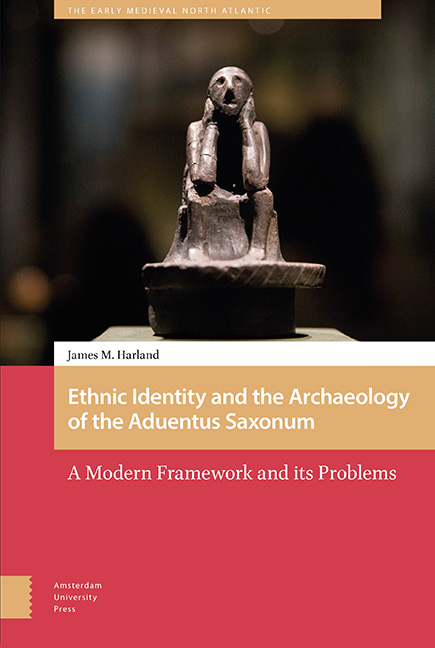Book contents
- Frontmatter
- Dedication
- Table of Contents
- List of Tables and Figures
- Acknowledgements
- 1 Introduction
- 2 Ethnicity and Archaeology
- 3 Empiricism and Metaphysics
- 4 Deconstructing Anglo-Saxon Archaeology
- 5 The Material Evidence Reconsidered
- 6 Building an Alternative
- 7 New Approaches and Final Reflections
- Appendix: Spong Hill Data
- Bibliography
- Index
- Frontmatter
- Dedication
- Table of Contents
- List of Tables and Figures
- Acknowledgements
- 1 Introduction
- 2 Ethnicity and Archaeology
- 3 Empiricism and Metaphysics
- 4 Deconstructing Anglo-Saxon Archaeology
- 5 The Material Evidence Reconsidered
- 6 Building an Alternative
- 7 New Approaches and Final Reflections
- Appendix: Spong Hill Data
- Bibliography
- Index
Summary
This book is a historiographical investigation into the study of ethnic identity in the early medieval period. It focuses on the migration from northern Germania of the diverse groups whom our late Roman sources knew as ‘Saxons’ to Britain over the course of the ‘long’ fifth century, which took place alongside the collapse of effective Roman rule over that diocese in the late fourth and early fifth centuries AD. In the book, I explore the means by which archaeologists from the late twentieth century to the present day have attempted to make use of the material remains of that period to infer the presence of ethnic identity, and the methods of those who have decried such attempts. The understanding that archaeologists have had of ethnicity is vastly variable, and in the following work I aim to outline the unconscious assumptions and explicit theoretical thought processes that these archaeologists make use of when applying this concept in their analyses. To achieve this, I examine the methodological and interpretative choices which archaeologists make, and the justifications made of these choices.
That such a work is needed has been recognised for quite a long time. Surveys of the discipline's development from its antiquarian roots are well established, and the interested reader has several options to choose from in that regard, but, until very recently, there has been little in the way of historiographical engagement with contemporary work on the subject. In 2005, Howard Williams pointed out that studies on the origins of the field
have identified the need for a critical appraisal of the socio-political context of the discipline in the light of racial theories and nationalism. However, to date there have been no sustained and detailed assessments that attempt to pull apart the theoretical agenda and biases of late antique and early medieval archaeologists, nor a consideration of how such biases are interpreted in academic and public contexts.
Though Sam Lucy's and Howard Williams's crucial and groundbreaking work offers a coherent critical overview of nineteenth- and early-twentieth-century approaches to this subject, no such work has yet been produced for more recent archaeological scholarship, including that of Lucy herself.
- Type
- Chapter
- Information
- Ethnic Identity and the Archaeology of the aduentus SaxonumA Modern Framework and its Problems, pp. 13 - 40Publisher: Amsterdam University PressPrint publication year: 2021

